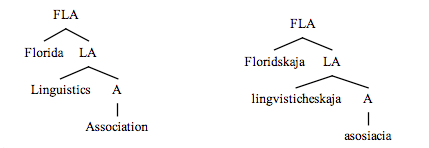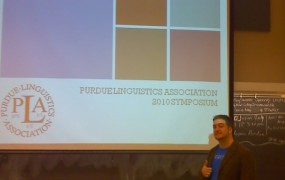The Russian Morphology Dilemma of the FLA
Wednesday, March 14th, 2012 @ 9:41PM
[F[LA]]? [FL[A]]? Ugh.. from Russia with Love and Frustration –Article by Lee Ballard
One of the things I love about linguistics is the fact that languages are different. Sometimes these differences can seem small and trivial, other times maddeningly frustrating, but most of the time, sort of just “there.”
Since I’m living in a Russian-speaking country, when talking to people about my work, translating the “FLA” or “Florida Linguistics Association” caused me to face a pretty big problem. And the problem was clearly in the realm of . . . morphology. Uh-oh. Has anyone found it since the last time I was trying to find mine?
In English, N-N (that’s “noun-noun”) compounds are pretty interesting:
– the head noun appears on the right
– the modifier noun appears on the left
– case marking doesn’t come into the picture
– there are some stress issues: to make a long story short, the stress usually falls to the left of the head noun
– the modifier noun appears in the singular, even for many nouns that normally exist only in the plural. This is evidenced by such forms as “tooth decay” “drug addiction” “pant leg” (but there are counterexamples to this generalization, like a few quirky nouns, as well as variation other varieties of English, for example “a drugs problem”.)
In Russian, N-N phrases are pretty standard:
– the head noun appears on the left in whatever case is needed
– the modifier noun appears on the right, “frozen” in the genitive case
But they can also be translated with the suffix “sk” (the same Slavic morpheme as Polish names in skiy), in which case
– the head noun appears on the right in whatever case is needed
– the modifier noun is Adjectivized / de-nominalized with a suffix — /sk/, /ov/,
/in/ etc.
– the modifier de-nominal Adj appears on the left
– the modifier de-nominal Adj agrees in number/gender/case with the head noun
In English, I came up with two parsings for FLA, both of which sound the same, but which imply a different Russian translation. Here are the pictures:
1) < = = >
The Russian version of this would be
asosiaci-a Florid-sk-oj lingvistik-i
Association-NOM.FEM Florida-ADJ-GEN.FEM Linguistics-GEN.FEM
Here’s the second version:
2) < = = >
The Russian version of this would be
Florid-sk-aja linguistich-esk-aja asosiaci-a
Florida-ADJ-NOM.FEM Linguistics-ADJ-NOM.FEM association-NOM.FEM
Ah, the gray area! The inability to make a grammaticality judgement!
Any native Russian-speaking linguists out there that can give us your intuitions?
Until next time, as RuskyEd says — DAS VIDANYAH!!
PS http://ruskyed.com/
Posted by floridalinguistics
Categories: Lee Ballard











